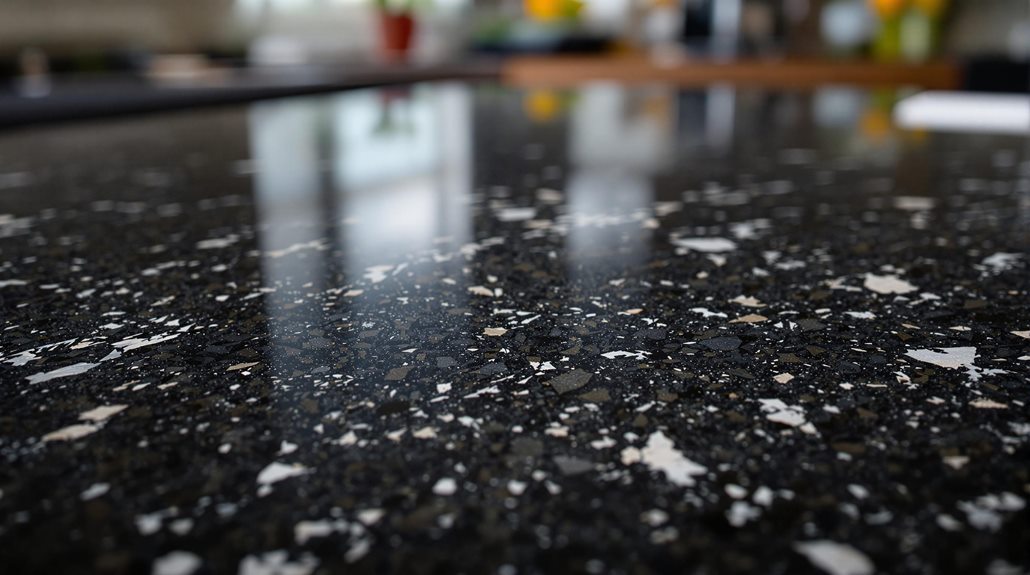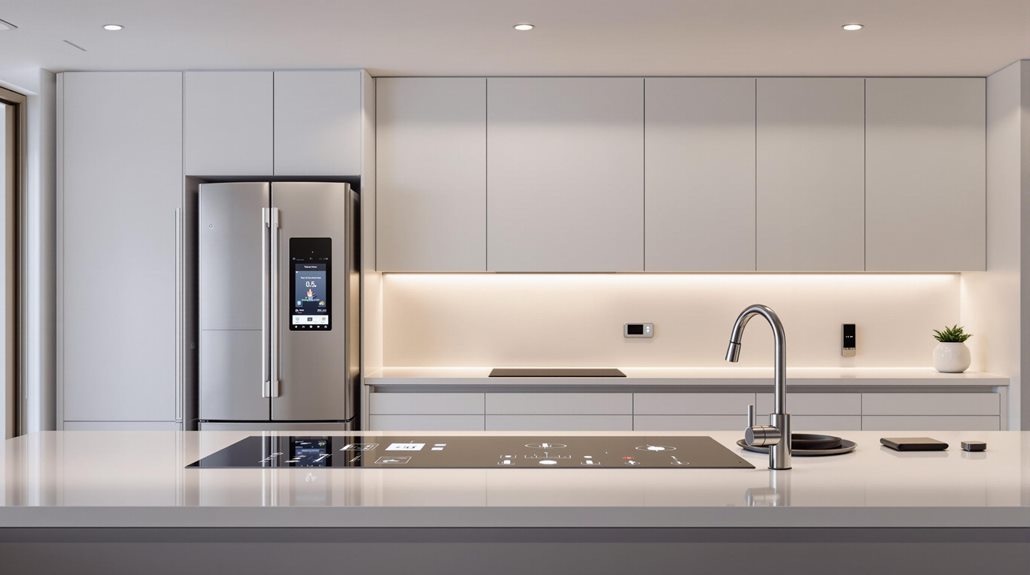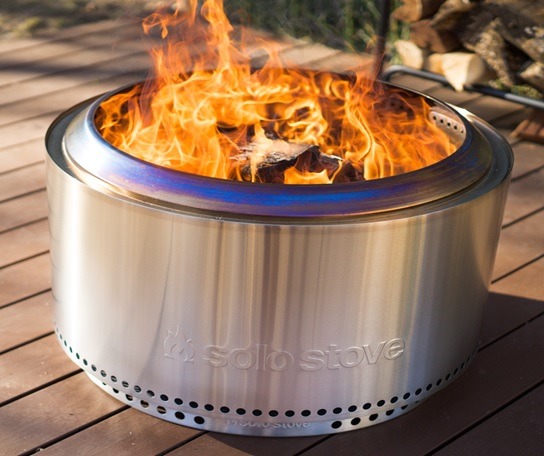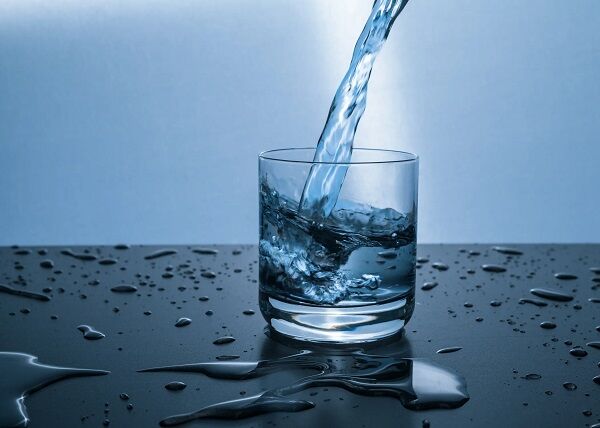What Is the Most Durable Countertop Made?

Engineered quartz countertops are your most durable option for kitchen surfaces, rating an impressive 7 on the Mohs Hardness Scale. You'll find they're extremely resistant to scratches, stains, and bacteria growth, thanks to their non-porous composition of crushed quartz and resins. Unlike natural stone alternatives like granite or quartzite, you won't need annual sealing to maintain their protective properties. They're also backed by the longest warranties in the industry, typically 10-15 years. While natural stones offer their own unique benefits, quartz's combination of durability and low maintenance requirements makes it the clear frontrunner for those seeking lasting performance.
Understanding Countertop Durability Ratings
Durability ratings serve as your compass when traversing countertop options for your home. The Mohs Hardness Scale, a key measurement tool, helps you understand how well different materials resist scratches and daily wear. On this scale, quartz countertops lead the pack with a hardness rating of 7, making them exceptionally resistant to scratches, chips, and cracks under normal use.
You'll find granite countertops following closely behind, scoring between 6 and 7 on the Mohs Scale. This natural stone's durability extends beyond scratch resistance, as it stands up well to heat and acidic foods when properly sealed. If you're considering solid surface options like Corian, you'll benefit from their non-porous nature and repairability, though they don't match the hardness of quartz or granite.
Soapstone offers another durable choice, featuring natural density and non-porosity that resist heat and stains. However, you'll need to maintain it carefully to prevent chipping. While tile countertops provide heat resistance, they're more susceptible to cracking from impact and require regular grout maintenance. Understanding these ratings helps you match your lifestyle needs with the right countertop material.
Quartz: The Ultimate Kitchen Surface
Expert kitchens deserve the unrivaled strength of quartz countertops, today's most sought-after surface material. As the most durable countertop material available, you'll find that quartz offers exceptional resistance to daily wear and tear while providing stunning aesthetics for your kitchen space.
Here's what makes quartz countertops stand out:
- Ultra-resistant to scratches, stains, and bacteria growth
- Never needs sealing due to its nonporous composition
- Available in countless color and pattern options
- Engineered for superior durability using crushed quartz and resins
While you'll need to exercise some caution with high heat exposure, quartz countertops deliver outstanding performance in busy kitchens. The engineered stone's resistance to scratches and stains means you won't have to worry about damage from everyday cooking activities. Though slightly less heat-resistant than granite, you can prevent heat damage by using trivets for hot pots and pans.
With installation costs ranging from $50 to $120 per square foot, quartz represents a premium investment in your kitchen's future. You'll appreciate its blend of durability and style, making it an ideal choice for homeowners who want long-lasting kitchen countertops without sacrificing aesthetics.
Natural Stone Countertop Options

Beyond engineered surfaces, natural stone countertops offer timeless beauty and distinctive characteristics for your kitchen. When exploring durable countertops, you'll find several natural stone options that deliver outstanding performance and longevity.
Granite countertops remain a popular choice due to their exceptional durability. With proper annual sealing, they'll resist heat damage, cracks, and chips effectively. If you're seeking a material that closely matches quartz's durability while maintaining a natural appearance, consider quartzite. This natural stone provides excellent resistance to scratches, stains, and heat, though you'll need to seal it annually to maintain its protective properties.
Soapstone presents another appealing option for your kitchen. This dense, non-porous natural stone won't stain and handles heat well, but you should be aware that it may chip or crack over time. While marble is often admired for its luxury appeal, it's the most high-maintenance option among natural stones, requiring significant upkeep to prevent damage from heat, water, and chemicals. When choosing between these materials, consider both their durability features and maintenance requirements to find the best fit for your lifestyle.
Engineered Materials Vs Natural Materials
While natural stone options each have their unique appeal, understanding how they stack up against engineered materials can help you make an informed decision for your kitchen.
When comparing engineered stone to natural materials, you'll find significant differences in durability and maintenance requirements. Quartz countertops lead the pack as the most scratch-resistant and low-maintenance option, combining crushed quartz crystals with sturdy resins. Similarly, solid surface countertops offer unique benefits with their seamless appearance and repairability.
If you're debating between granite or quartz, consider these key differences:
- Quartz countertops resist stains and heat damage without requiring periodic sealing
- Engineered materials maintain their appearance longer with minimal upkeep
- Natural stones need regular maintenance and sealing to prevent damage
- While more expensive initially, engineered options typically last longer
Despite the higher upfront cost, engineered materials like quartz and solid surface countertops often prove more cost-effective in the long run. You won't need to worry about constant maintenance, and their superior durability means they'll maintain their appearance for years to come. This makes them an excellent choice for busy households where practicality is as important as aesthetics.
Heat and Scratch Resistance

Since durability remains a top concern for homeowners, understanding heat and scratch resistance can make or break your countertop decision. When you're comparing different materials, you'll find that quartz leads the pack as the most resilient countertop surface. It won't scratch under normal use and can handle hot pots without showing damage.
If you're considering natural stone, granite offers impressive heat resistance up to 275°F and doesn't require additional sealants to maintain its scratch-resistant properties. For an engineered option, solid surface materials like Corian provide reliable durability against everyday scratches and high temperatures.
You'll also find excellent performance from recycled glass countertops, which combine both scratch and heat resistance while offering an eco-friendly alternative. These surfaces stand up well to daily kitchen demands and work great in bathrooms too. If you're drawn to concrete countertops, you'll get strong resistance to scratches and heat, though you'll need to stay on top of sealing maintenance to preserve these properties. Each material offers unique benefits, but quartz remains the most durable option when considering both heat and scratch resistance.
Cost Comparison of Durable Countertops
Today's countertop market offers durable options across a wide range of prices, from budget-friendly laminate at $18 per square foot to premium recycled glass reaching $250 per square foot installed. When you're searching for the best countertop materials, it's essential to balance durability with your budget.
- Quartz stands out as one of the best countertop products, offering superior durability at $76-$103 per square foot installed, with Corners and edges that resist chipping
- Granite remains a popular choice for kitchen countertops, costing $52-$144 per square foot uninstalled, providing excellent durability and natural beauty
- Solid-surface options like Corian provide a mid-range solution at $60-$97 per square foot before installation, offering seamless appearance and reparability
- Crushed glass countertops command premium prices of $100-$250 per square foot installed, combining sustainability with extreme durability
While laminate countertops offer the most economical choice at $18-$38 per square foot, they don't match the durability of higher-end materials. Your investment in more durable materials like quartz or granite can pay off through longer lifespan and better resistance to daily wear and tear in your kitchen.
Maintenance Requirements and Longevity

Understanding maintenance requirements can help you maximize your countertop investment across its lifespan. Among all options, quartz stands out as practically indestructible under normal use conditions, being easy to maintain without requiring annual sealing. You'll find it consistently resists stains, scratches, and can handle a hot pot without damage.
While granite is relatively durable and can withstand daily wear and tear, you'll need to commit to annual sealing to maintain its stain resistance. Corian offers unique benefits, especially when dealing with acidic foods, as it doesn't require special sealers. However, you'll need to address scratches through sanding when they occur.
Laminate countertops demand careful attention, as they're more susceptible to damage and aren't easily repaired once compromised. With tile countertops, while the tiles themselves are durable, you'll face ongoing maintenance challenges with grout lines. These areas require regular sealing to prevent bacterial growth and maintain cleanliness.
To maximize longevity, match your lifestyle with your countertop's maintenance needs. If you're seeking minimal upkeep, quartz offers the best combination of durability and low maintenance requirements.
Commercial Grade Kitchen Surfaces
In demanding commercial kitchen environments, selecting the right countertop material can make or break your operation's efficiency. You'll want to focus on materials that can withstand constant use while maintaining their appearance and functionality.
- Quartz countertops lead the pack as the most durable option, offering superior resistance to scratches, stains, and heat without requiring sealing
- Stainless steel delivers exceptional performance with its nonporous surface that's easy to sanitize and maintain
- Solid-surface countertops provide seamless installation and excellent resistance to bacteria and mold growth
- Ceramic tile stands up to high temperatures and heavy use while remaining simple to clean
When you're equipping your commercial kitchen, you'll find that each material offers unique advantages. Quartz gives you worry-free durability, while stainless steel provides industrial-strength performance. If you're looking for something more traditional, granite countertops deliver both durability and natural beauty, though they'll need regular sealing. For a balance of aesthetics and functionality, solid-surface options like Corian offer the perfect middle ground. Your choice should ultimately depend on your specific needs, but any of these commercial-grade materials will serve your kitchen well for years to come.
Impact and Chemical Resistance

When choosing a countertop that can stand up to harsh impacts and chemical exposure, you'll want to focus on materials engineered for maximum durability. Engineered quartz stands out as your most reliable option, offering superior resistance to both physical damage and chemical exposure. Its non-porous surface, composed of 90-95% ground quartz crystals bound with resin, prevents liquids and chemicals from penetrating and causing damage.
While granite is also highly durable and resistant to impacts, it requires regular sealing to maintain its defense against chemical damage and stains. You'll find that unsealed granite can absorb liquids and potentially harbor bacteria. In comparison, solid surface countertops offer good chemical resistance but don't match quartz's impact resistance, as they're more prone to scratches and burns.
If you're considering recycled glass countertops, keep in mind that while they're resistant to heat and chemicals, they can crack or chip under heavy impact. For the best combination of impact and chemical resistance, quartz remains your strongest choice, requiring no sealing while providing consistent protection against both physical trauma and chemical exposure.
Installation and Warranty Considerations
Professional installation of your countertop goes hand-in-hand with its long-term durability and warranty protection. When you're choosing among the various countertops that are available, it is crucial to understand that most materials require professional installation to maintain warranty coverage. Quartz countertops, which contain polyester resins, offer the most extensive warranties, typically lasting 10-15 years, while materials like granite provide shorter coverage periods of 1-5 years.
- Called resin-based materials, solid surface countertops come with lifetime limited warranties and are easier to repair if damaged
- Granite countertops need annual re-sealing to maintain their properties of resisting heat and stains, but this maintenance isn't covered under warranty
- Tile countertops present unique warranty challenges since coverage typically applies only to the tiles, not the grout or installation work
- Professional installation guarantees proper sealing, support, and fit, protecting both your investment and warranty coverage
When considering durability and long-term value, you'll want to factor in both installation requirements and warranty coverage. Remember that attempting DIY installation can void your warranty, potentially leaving you responsible for costly repairs or replacements down the line.




